Before we begin our review of the excellent work by Urcan and Hilbert, let’s take a moment to mention the new title Chess International Titleholders, 1950-2016 by Gino Di Felice, McFarland, ISBN 9781476671321, Paperback, 376pp. $49.95.
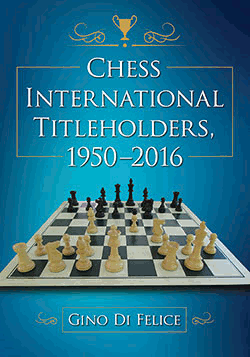
The book lists more than 18,000 players who received FIDE (Fédération Internationale des Échecs) titles from 1950 to 2016. Entries include, when available, the player’s full name, federation, date of birth, place of birth, date of death, place of death, title and year of award and peak rating (month and year), with references provided. It lists those players from candidate master to grandmaster, including wome’s titles and excluding correspondence titles.
One might well question the importance of listing every candidate master, whose rating threshold is 2200 and above for men, and 2000 and above for women. Yet, if you have achieved that title, then, no doubt, you are pleased to be included in the book. Also, consider players such as FIDE Master (2300 or higher) John Curdo, a New England legend, who certainly deserves acclaim, and deserves to be mentioned in a work of this sort.
Chess International Titleholders, 1950-2016 will be an invaluable resource to chess journalists and historians, as well as of keen interest to everyone listed in the book.
W.H.K. Pollock, A Chess Biography with 523 Games, Olimpiu G. Urcan and John S. Hilbert, McFarland, ISBN 9780786458684, Hardcover, 512pp. $65.00
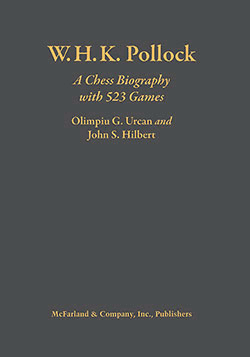
Olimpiu Urcan and John Hilbert are both authors of the Past Pieces column here at ChessCafe. Both have published several books on chess history from McFarland and other publishers, and Urcan is a regular contributor to Edward Winter’s Chess Notes online column. It is a credit to the authors that Winter wrote, “The Pollock book is one of the finest in the entire McFarland catalogue.”
This biography of William Henry Krause Pollock examines in great detail his chess career and life in America, England, and Ireland. Pollock played matches against players such as Eugene Delmar, John McCutcheon, and Jackson W. Showalter among others.
The main contents are divided as follows:
Part One: Life and Chess Career (1859-1896)
Part Two (1882-1896): Games 1-518
Part Three: Appendices, Bibliography, Indices
Of this latter section, there are thirteen appendices and five indices. There are also sixty-eight historical photos and line drawings throughout the book. Collected here are more than five hundred annotated games and fragments played by Pollock. Compare this to the 145 games in Pollock Memories by Frideswide Rowland from 1899 and you can see the incredible amount of research that went into this book. Sources include chess journals and magazines with chess columns from America, Canada, and the United Kingdom. In fact, the footnotes alone would probably fill the contents of a book from a lesser publisher.
The description of Pollock’s playing style from the preface should energize any reader to a deeper investigation into its contents:
“In chess Pollock loved sacrifice, tactical complications, and a rollicking game full of wit and adrenaline, a fireworks display of personality and daring.”
The authors note that “as might be expected of someone whose keenest delight lay in opening lines and pursuing attacks, the number of decisive games among Pollock’s published oeuvre is overwhelming: 90 percent.” They describe Pollock as an idealist in life as well as in chess. A doctor of medicine by training, Pollock took up the “precarious” life of a chess professional; “one that barely afforded him the chance even to return to the home of his youth to die.”
While I recommend the book highly, there are some items of dissatisfaction. For one, the prose is a little dry in the biographical section. History as story-telling, rather than a plain recitation of facts, is more engaging to the reader. Also, when mentioning prize monies won, I would have wished to have seen the modern exchange equivalent to put them into context.
A greater issue is that there is too much of a disconnect between the biographical section and the games section. When the authors are discussing a particular tournament or game, it would be convenient to have that game presented immediately, or at least referenced with a page or game number to which to turn. As it is, one must thumb to the index, find the listing, and then go to the proper page. A cumbersome task to expect from the reader. If you are discussing a game in the text, it makes sense to present the game directly, rather than make the reader hunt and peck for it. Similarly, in the game section, if you want to know the details of the tournament, you have to return to the biographical section for the details. And, there are no crosstables whatsoever. So there is no way to easily examine the standings of any single event.
This disconnect also leads to discrepancies. For instance, in the biographical section, in discussing the game Pollock-Ryan, New York, 1953, we have the following on page 152:
“After 26 moves in a Ponziani Opening, Pollock obtained the following, dominating position:”
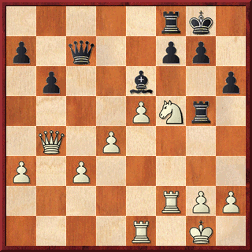 [FEN “5rk1/p1q2pp1/1p2b2p/4PNr1/1Q1P4/P1P5/5RPP/4R1K1 w – – 0 27”]
[FEN “5rk1/p1q2pp1/1p2b2p/4PNr1/1Q1P4/P1P5/5RPP/4R1K1 w – – 0 27”]
“Pollock continued correctly for a time with 27.Ne7+ Kh8 28.d5! (stronger than 28.Ng6+ Rxg6 29.Qxf8+ Kh7). But after 28…Re8, he missed the brilliant 29.fxe6! Rxe7 30.Qxe7! Qxe7 31.fxe7, with a simple win for White. Instead, Pollock played the inferior 29.d6, allowed Ryan to sacrifice the exchange to release the pressure, and then blundered severely, allowing his queen to be trapped. The game lasted three hours and 48 minutes and was a complete collapse for the unfortunate Pollock, who thereby lost what easily could have been one of his cleanest wins in the tournament.”
Turning to the games section, on page 403, the authors write “28.d5!? The simple 28.Ng6+ Rxg6 29.Qxf8+ Kh7 30.Re3 was perhaps more straightforward.”
The games section itself has the following peculiarity:
399. Pollock-J.L. McCutcheon
Pittsburg, Allegheny Chess Club
10 March 1893
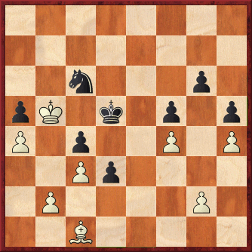 [FEN “8/8/2n3p1/pK1k1p1p/P1p2P1P/2Pp4/1P4P1/2B5 b – – 0 1”]
[FEN “8/8/2n3p1/pK1k1p1p/P1p2P1P/2Pp4/1P4P1/2B5 b – – 0 1”]
“An endgame sequence rich in errors on both sides. 1…Nb8? 1…Ne7 2.Kxa5 Kc5 3.g3 Nd5 4.Bd2 Kc6 would have kept the balance. 2.Kxa5 Nd7 3.Kb4? 3.Kb5! Nc5 4.a5 should have won. 3…Nc5! 4.a5 Nb3 5.Bd2? 5.Kb5 Nxc1 6.a6 d2 7.a7 d1Q 8.a8Q+ Ke6 9.Qe8+ Kf6 10.Qf8+ would have secured a perpetual check. 5…Nxd2 6.a6 Ke4? 7.a7 Ke3 and the game was drawn several moves later. 1/2-1/2 Objectively White should win this as follows: 8.a8Q Ne4 9.Qa7+ Ke2 10.Qg7 d2 11.Qxg6 Nf2 (11…d1Q 12.Qxh5+ Ke1 13.Qxd1+ Kxd1 14.h5 Nf6 15.h6 Kc2 16.Kxc4 Kxb2 17.Kd4 and White wins.) 12.Qxf5 d1Q 13.Qxh5+ Ke3 14.Qxd1 Nxd1 15.f5 Nxb2 16.Kc5 Na4+ 17.Kxc4 and Black cannot stop the pawns.”
535. Pollock vs. John L. McCutcheon
1…Nb8 and White (Pollock) drew
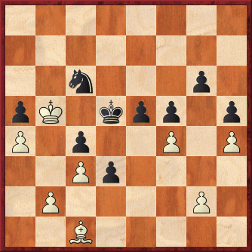 [FEN “8/8/2n3p1/pK1kpp1p/P1p2P1P/2Pp4/1P4P1/2B5 b – – 0 1”]
[FEN “8/8/2n3p1/pK1kpp1p/P1p2P1P/2Pp4/1P4P1/2B5 b – – 0 1”]
“F.F. Rowland: ‘The following fine ending arose in a game played in Pittsburg, between Mr. Pollock, of Albany, New York, and Mr. John L. McCutcheon. Black drew elegantly, as follows: 1…Nb8 2.Kxa5 Nd7 3.Kb5 Nc5 4.a5 Nb3 5.Bd2 Nxd2 6.a6 Ke4 7.a7 Kxf4 8.a8Q Ke3 and the game is drawn.’ A few notes by the authors: 1) Black can win with 1…e4! 2.Be3 Ne7 3.Bd2 Nc8 4.Kxa5 Kc5 5.Be3+ Kc6 6.Kb4 Nb6 7.Bd2 e3 etc. 2) 3…Nc5 is an error that gave White winning chances; best was 3…e4 with a draw in hand; 3) Instead of 4.a4 (sic), even stronger was 4.fxe5! Nd7 5.e6 Kxe6 6.a5; 4) Instead of 5.Bd2, 5.a6! was more precise for a clear win.”
On page 33 the authors disparage MacDonnell for being critical of Pollock’s play: “Although some of his wrath appears to have been fueled by his own loss to the younger man:”
“Mr. Pollock came out next to Mason with a score of 3 games. His play disappointed me very much. It was only episodically good. He frequently drifted into a bad position without knowing it.”
MacDonnell goes on to say that Pollock’s win against him was a matter of luck, and that Pollock’s play could benefit from a little more earnestness and enthusiasm if he is to reach the highest levels. The authors note that MacDonnell never had the slightest advantage in their encounter, and that he evaluated Pollock’s play “through the lens of his own ego.”
However, MacDonnell’s assessment seems accurate given the authors own description of Pollock’s playing style, and when compared with the quote from the Leeds Mercury (Weekly Supplement), taken from Pollock’s obituary, that begins the book:
“A brilliant man was poor Pollock, an enemy to no one but himself, and decidedly a chess genius, in whose compnay none could be for a moment dull. He has left many marks of his brilliant chess genius, and it may possible be the work of some enthusiast to gather his gems together, and present them to the chess world as a most appropriate monument to his memory.”
Nevertheless, let’s be thankful that Urcan and Hilbert chose this moment to present us with W.H.K. Pollock.
Leave a Reply